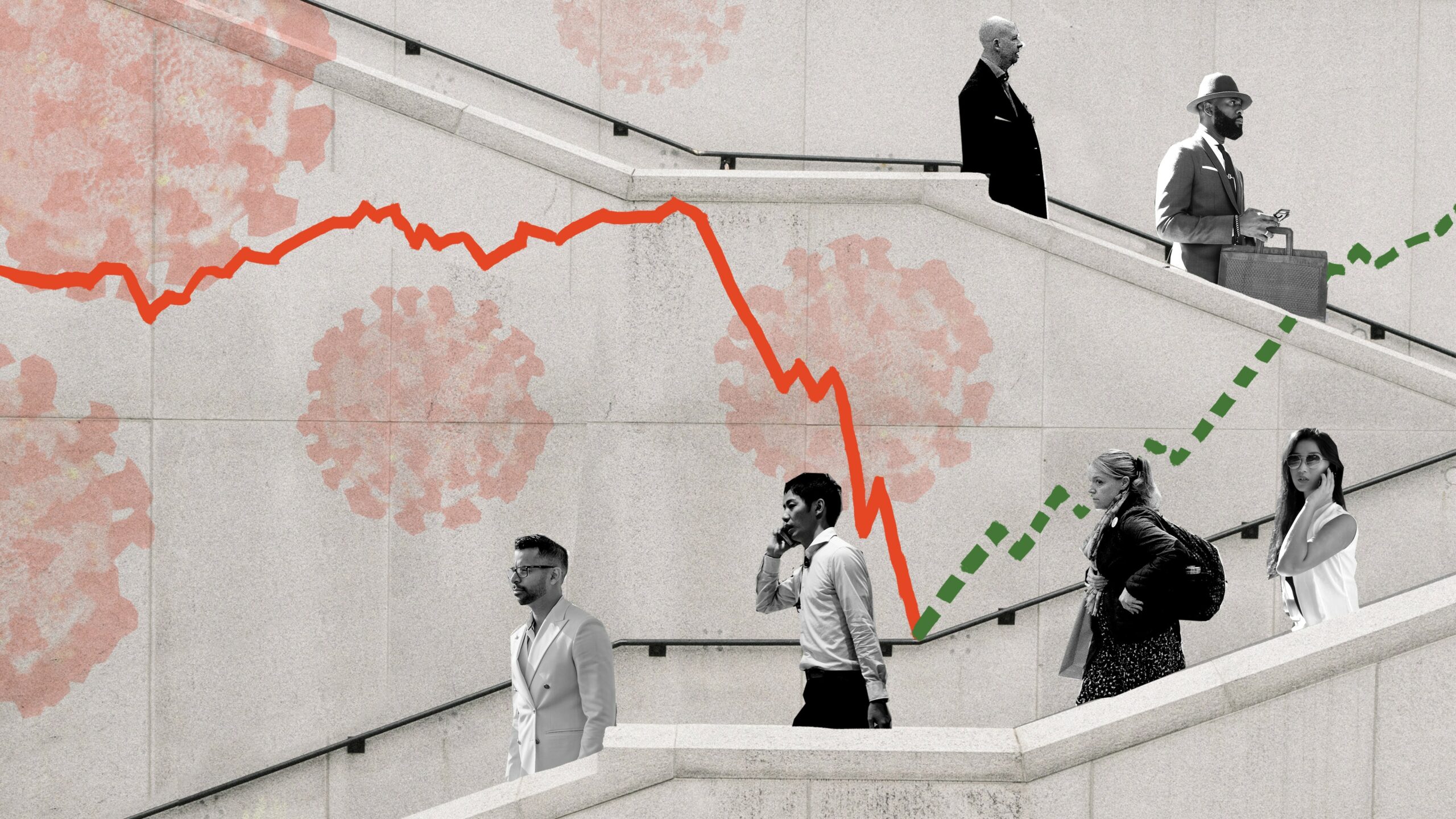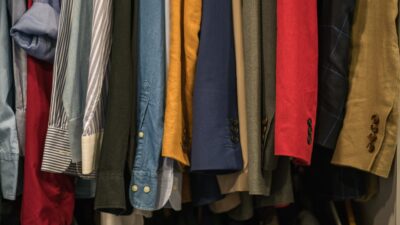Sandra Peter and Kai Riemer

The greater good on Corona Business Insights
Public health versus economic risk – how as a society do we come to agree what we’re collectively working towards?
As COVID-19 sets out to change the world forever, join Sandra Peter and Kai Riemer as they think about what’s to come in the future of business.
Shownotes
COVID is unmasking America’s collective action problem
Leadership for the greater good
Stefan Volk on why COVID-19 is first and foremost a social dilemma
This episode is part of a podcast series covering what COVID-19 will mean for the business world, where we look at the impact on the economy, businesses, industries, workers and society. This is part of our ongoing coverage of the impact of COVID-19 on the future of business.
Follow the show on Apple Podcasts, Spotify, Overcast, Google Podcasts, Pocket Casts or wherever you get your podcasts. You can follow Sydney Business Insights on Flipboard, LinkedIn, Twitter and WeChat to keep updated with our latest insights.
Send us your news ideas to sbi@sydney.edu.au.
Dr Sandra Peter is the Director of Sydney Executive Plus and Associate Professor at the University of Sydney Business School. Her research and practice focuses on engaging with the future in productive ways, and the impact of emerging technologies on business and society.
Kai Riemer is Professor of Information Technology and Organisation, and Director of Sydney Executive Plus at the University of Sydney Business School. Kai's research interest is in Disruptive Technologies, Enterprise Social Media, Virtual Work, Collaborative Technologies and the Philosophy of Technology.
Share
We believe in open and honest access to knowledge.
We use a Creative Commons Attribution NoDerivatives licence for our articles and podcasts, so you can republish them for free, online or in print.
Transcript
Intro From the University of Sydney Business School, this is Sydney Business Insights.
Sandra And this is Corona Business Insights. I'm Sandra Peter.
Sandra And with everything that's happening out there, it's difficult to understand what COVID-19 will mean for the business world. So in this series, we've been unpacking its impact on business, economy, industry, government, workers, and society, and looking at the effects of the pandemic.
Kai And I'm Kai Riemer.
Kai And this podcast is part of a larger initiative by the University of Sydney Business School. Our COVID business impact dashboard is a living initiative, which we constantly update with insights and resources from academics from industry experts from Nobel Prize winners and movers and shakers
Sandra And you can find all of these resources online at sbi.sydney.edu.au/coronavirus.
Kai And today we talk about what is the common good in times of the COVID-19 pandemic.
Sandra Over the last few months we've repeatedly heard politicians, business leaders, the general public saying over and over again that 'we're all in this together'. So in this podcast, we thought we would talk a little bit about the common good, and try to look at why collective action in times of crisis in times of a pandemic, is sometimes quite easy, but sometimes quite difficult.
Kai And we want to ask the question, what does this mean, when we're saying we're all in this together? How as a society do we come to agree what we're collectively working towards?
Sandra So first, let's remind ourselves that the common good refers to those things, whether they're physical things or cultural things or institutional things that we as members of a community or as members of a society, decide we want to provide to all other members of a community to make sure that our common interests are served. So pretty much what we owe one another as citizens. It refers to the sharing of certain benefits in society but also of certain burdens that we incur in living our lives together. And examples of this would be things like police protection, or the road system or public parks or our courts, our museums and cultural institutions, public transport, freedom of speech, National Defence, and so on.
Kai But sometimes the notions of common good become contested when conflicting values are on the table and different parts of society argue for different kinds of what each refers to as the common good. And so we thought we'd take a look at the COVID-19 pandemic, first of all, at the various instances of collective action and working towards the common good that we've all already experienced. And then looking forward to what are the kind of conflicting notions of common goods that arise, ones for coming out of the pandemic, and what we can do to understand the implications of this.
Sandra So as we were going into the pandemic, where we started to see spikes in the number of cases around the world, the first conflicting notions of what the common good is started to emerge as the cases were growing, in some places quite slowly, people started to debate whether the common good was the risk the disease posed to public health, or whether the risk was more of an economic risk posed to the economy. So should we lockdown or should we not lockdown was the first of these debates.
Kai And we saw a first example of how difficult it is to achieve collective action with hoarding behaviour, where individuals prioritised their own access to grocery staples, or famously toilet paper over the fair community distribution of those goods that became quite scarce as stockpiling started to take place.
Sandra But as the pandemic took hold in Australia, for instance, we came to a shared understanding that we are all in this together and that the public health risk was the bigger threat to the community will lockdown, everybody stayed home and for a couple of months at least there was a fairly clear consensus of what the common good is.
Kai So in Australia, the states and federal government set aside partisan divides and a national cabinet was formed of the state and federal leaders to jointly discuss and decide on a pandemic response. And quite overwhelmingly, the population supported the lockdown, people stayed home, activity around the country slowed down markedly as the data has shown. And Australia was able to curb the spread of the pandemic and most states have gone to zero or very little case numbers right now. But the situation regarding what the common good is, is now becoming less clear.
Sandra But slowly as we come out of the pandemic, we shifted our consensus to the common good now being economic recovery and the economic risk came to the forefront and we backgrounded the public health risks but as cases are starting to grow in places like Victoria. Questions are arising now on whether or not the lockdown should continue, or whether or not as we've famously heard in the US, the cure is worse than the problem.
Kai In Australia, we've been fortunate enough to go from health responds to economic response. In countries like the US or the UK, and a whole lot of other countries around the world where the economic pressure to open up the economy, to open up businesses is becoming stronger and stronger. The question of what is the common good, keeping things locked down trying to further flatten the curve, trying to respond to the virus, or trying to instil more economic activity, letting people out letting them go about their daily business outside has now become a matter of much discussion. And so the question of what is the common good is no longer clear cut.
Sandra And this makes collective action very difficult, because let's not forget the moment we agree on what this is. This enables us to collectively do something as a society. So for instance, staying at home or indeed returning to work. But it also manifests itself in things like social distancing, which only works if we all try to do it or wearing face masks. Again, you need collective action and enough people to be doing it. The adoption of contact tracing apps like COVIDSafe works best if it's adopted by at least 60% of the population.
Kai And of course, this is a great example to show how collective and individual action often clash. So collectively, it would be best if everyone was to install and use the COVIDSafe app on their phones all the time. But at the same time, many people are worried about privacy implications even though technically this might be negligible to trust in the government might not be there to install an app, especially when the individual usefulness of this app is quite limited. It is only interesting and relevant when there's an actual infection, when there's an actual case. In the face of very low case numbers in Australian society, many people might say, giving up some individual privacy for what is a collective action in the face of very low numbers might not be worth it. And so we might then forego the collective action to bring in place this important measure to further control any further outbreaks. Because the common goods is no longer heavily weighing on people's minds as case numbers are low and we're opening up the economy, and we have moved on to a different understanding of common good, which is now economic activity and getting back on our feet and going out and about.
Sandra But striking a balance and giving expression to what the common good this is important not only for governments and for individual citizens themselves, but it's also an important issue for businesses. As we come out of lockdown and as restrictions ease, all companies must grapple with the idea of what the social good is. Some companies have made social purpose their mission, but what does it mean for a company to act in line with the social good at this time? Should they be asking people to go back to work and risk public health and future outbreaks? Should companies try to keep people employed, risking the health of the company or should companies lay people off putting the burden back on the general public or back on the state and trying to preserve the health of the economy or the health of businesses themselves?
Kai And not only this, as the immediate pandemic subsides and the public health response is no longer the one public good that trumps everything. It is not just the economic recovery that now comes to the fore, there is other issues in society that warrant attention, the climate response or more immediately in recent times, social justice movements such as Black Lives Matter. And we can see here in the organisation of public demonstrations and public rallies, that sometimes these notions of what is the most pressing common good. Equality, social justice versus the pandemic, the public health response and keeping people safe can be at odds, even though collectively we might value both very highly. It then becomes contested, for example, whether or not it's okay to host a public rarely, in times of pandemic spread.
Sandra So as we're moving out of the pandemic, our clear consensus over what the overwhelming common good is, that is the risk to public health or preserving public health. As we come out of the pandemic and this consensus is falling apart, it remains to be seen how we strike a balance as we grapple with conflicting interests around the common good. Should the overarching interests be around market outcomes, around social justice, around public health or around economic recovery?
Kai And so as societies around the world struggle to achieve a sense of some sort of new normal, questions around common good will not only be contested, but it will increasingly become important in a world that is now short on resources and cannot possibly accommodate each and every goal in a contracting economy.
Sandra And that's where we want to leave it for today. This has been Corona Business Insights. Until next time
Kai Thanks for listening.
Sandra Thanks for listening.
Intro From the University of Sydney Business School, this is Sydney Business Insights, the podcast that explores the future of business.
Close transcript















